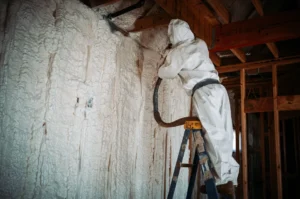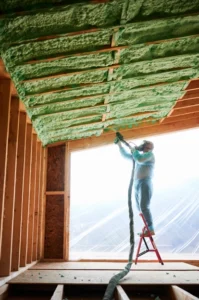Regarding energy-efficient home insulation, spray foam insulation has risen to the forefront as a popular choice. Its capacity to establish a completely sealed barrier and deliver outstanding thermal insulation has positioned it as the preferred choice for homeowners aiming to enhance energy efficiency and comfort in their homes. However, within spray foam insulation, two main categories stand out: open cell and closed cell. This article explores the differences between open-cell and closed-cell spray foam insulation, helping you determine the best fit for your home.
Understanding the Basics
Before we delve into the specifics, let’s briefly understand what open-cell and closed-cell spray foam insulation are;
Open Cell Spray Foam Insulation
Open-cell spray foam is composed of tiny cells that are not entirely encapsulated, leaving them open to each other. This type of insulation is soft and flexible, making it ideal for applications where it will not be subject to heavy loads or structural stresses. Open-cell foam is known for its excellent sound-absorbing properties due to its porous nature.
Closed Cell Spray Foam Insulation
On the other hand, closed-cell spray foam consists of cells that are completely sealed and closed. The result is a denser and stronger insulation material. Closed-cell foam is moisture-resistant and can provide some structural support due to its rigid composition. It has a higher R-value (a measure of thermal resistance) compared to open-cell foam, making it an excellent option for areas where space is limited but high insulation performance is required.
Factors to Consider
The following are the key factors one must consider before opting for spray foam insulation;
Insulation Performance (R-value)
The R-value is among the most important considerations when choosing between open-cell and closed-cell spray foam insulation. Closed-cell foam typically has a higher R-value than open-cell foam, providing better thermal resistance per inch of thickness. It makes closed-cell foam a preferred choice in regions with extreme temperatures.
Moisture Resistance
If you live in a humid or moisture-prone area, closed-cell foam’s compact structure makes it a better option. It acts as a vapor barrier and is less susceptible to water infiltration, reducing the risk of mold and moisture-related issues.
Air Sealing
Both types of spray foam insulation are exceptional at creating airtight seals, but closed cell foam’s denser structure makes it more effective in preventing air leakage. If you aim for maximum energy efficiency and air-tightness, closed-cell foam might be the way.
Sound Insulation
Open cell foam’s porous structure lends itself well to sound absorption, making it an excellent choice for reducing noise transfer between rooms.
Hiring a Professional for The Job
Regarding home improvement projects, it’s tempting to take the DIY route to save costs. Nonetheless, engaging a professional isn’t merely an indulgence; it’s an essential requirement for spray foam insulation installation;
- Safety Precautions
Spray foam insulates the use of chemicals and can release fumes during installation. Trained experts are well-versed in safely managing these substances, employing suitable protective equipment, and guaranteeing adequate ventilation.
- Accurate Application
Achieving the desired R-value and insulation performance requires accurate application of the foam. Professionals have the skills to measure and control the thickness of the insulation, ensuring that your home receives optimal thermal protection.
- Airtight Seal and Energy Efficiency
A key advantage of spray foam insulation is its capacity to establish an airtight seal, reducing air leakage and heat transfer. Professionals are trained to identify and seal gaps, cracks, and other areas that might compromise the insulation’s effectiveness.
- Building Code Compliance
Local building codes and regulations frequently govern installation standards for insulation materials. Professional insulation contractors are well-versed in these codes and ensure the installation meets all requirements.
Read More: What Are the Common Myths of Spray Foam Insulation Installations?
Conclusion
In the debate between open cell and closed cell spray, the choice depends on various factors, including your budget, climate, and specific insulation needs. While closed-cell foam offers higher R-values and better moisture resistance, open-cell foam shines in its sound-absorbing properties and cost-effectiveness.
To determine the best insulation for your home, it’s advisable to consult with a professional insulation contractor. They can assess your home’s unique characteristics and recommend the most suitable type of spray foam insulation. Whether your goal is to stay cozy during the winter, remain calm in the summer, or cut down on energy expenses, selecting the appropriate insulation can significantly enhance your home’s comfort and efficiency.
Upgrade your home’s insulation today! Let us help you choose the perfect spray foam solution for energy savings. Contact us Air Seal Insulation at (718) 821-6800.






